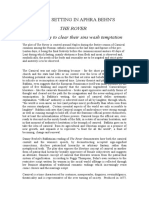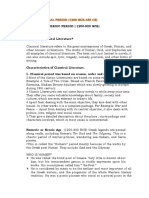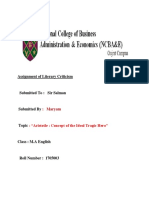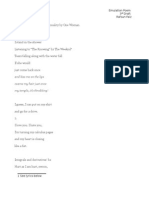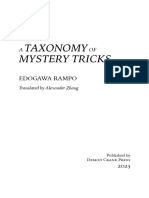75%(4)75% found this document useful (4 votes)
4K viewsSentimental Comedy
Sentimental Comedy
Uploaded by
Jyotishmoi BoraThe document discusses the rise of sentimental comedy and anti-sentimental comedy in the 18th century English drama. Sentimental comedy reacted against immoral restoration comedies, aiming to depict human goodness and virtue through emotionally engaging domestic plots. Sir Richard Steele's The Conscious Lovers (1722) was influential. Anti-sentimental comedy satirized manners and fashion through witty dialogues and social commentary, targeting shallow morals of the upper classes. Writers like Oliver Goldsmith and Richard Sheridan revived the old comedy form through works like She Stoops to Conquer (1773) and The Rivals (1775).
Copyright:
© All Rights Reserved
Available Formats
Download as DOCX, PDF, TXT or read online from Scribd
Sentimental Comedy
Sentimental Comedy
Uploaded by
Jyotishmoi Bora75%(4)75% found this document useful (4 votes)
4K views4 pagesThe document discusses the rise of sentimental comedy and anti-sentimental comedy in the 18th century English drama. Sentimental comedy reacted against immoral restoration comedies, aiming to depict human goodness and virtue through emotionally engaging domestic plots. Sir Richard Steele's The Conscious Lovers (1722) was influential. Anti-sentimental comedy satirized manners and fashion through witty dialogues and social commentary, targeting shallow morals of the upper classes. Writers like Oliver Goldsmith and Richard Sheridan revived the old comedy form through works like She Stoops to Conquer (1773) and The Rivals (1775).
Original Description:
sentimental and anti sentimental comedy
Copyright
© © All Rights Reserved
Available Formats
DOCX, PDF, TXT or read online from Scribd
Share this document
Did you find this document useful?
Is this content inappropriate?
The document discusses the rise of sentimental comedy and anti-sentimental comedy in the 18th century English drama. Sentimental comedy reacted against immoral restoration comedies, aiming to depict human goodness and virtue through emotionally engaging domestic plots. Sir Richard Steele's The Conscious Lovers (1722) was influential. Anti-sentimental comedy satirized manners and fashion through witty dialogues and social commentary, targeting shallow morals of the upper classes. Writers like Oliver Goldsmith and Richard Sheridan revived the old comedy form through works like She Stoops to Conquer (1773) and The Rivals (1775).
Copyright:
© All Rights Reserved
Available Formats
Download as DOCX, PDF, TXT or read online from Scribd
Download as docx, pdf, or txt
75%(4)75% found this document useful (4 votes)
4K views4 pagesSentimental Comedy
Sentimental Comedy
Uploaded by
Jyotishmoi BoraThe document discusses the rise of sentimental comedy and anti-sentimental comedy in the 18th century English drama. Sentimental comedy reacted against immoral restoration comedies, aiming to depict human goodness and virtue through emotionally engaging domestic plots. Sir Richard Steele's The Conscious Lovers (1722) was influential. Anti-sentimental comedy satirized manners and fashion through witty dialogues and social commentary, targeting shallow morals of the upper classes. Writers like Oliver Goldsmith and Richard Sheridan revived the old comedy form through works like She Stoops to Conquer (1773) and The Rivals (1775).
Copyright:
© All Rights Reserved
Available Formats
Download as DOCX, PDF, TXT or read online from Scribd
Download as docx, pdf, or txt
You are on page 1of 4
TEZPUR UNIVERSITY
ASSIGNMENT
COURSE TITLE: ENGLISH DRAMA II: Jacobean to 18th century
COURSE CODE: EG215
Submitted by: JYOTISHMOI BORA (EGB17007)
SENTIMENTAL COMEDY:
18th century sentimental comedy was a reaction to the comedy of manners. The basic
presumption on which it grew was that the man was good but was capable of doing wrong or
could be misled. It was an answer to the immoral restoration English drama.
The sentimental comedies’ roots can be traced back to 18th century tragedy which had a touch
of morality which was similar to sentimental comedy. Sentimental comedy appeals to our
feelings and emotions of sorrow, pity, and compassionate sympathy. These were mainly aimed
at producing tears rather than laughter as in other comic plays. The characters of these plays
were overly virtuous and their problems were also easily solved which got green signal from the
audiences as it depicted the true nature of human hardship. In these plays the author aims at
the innate goodness of people. In the end the protagonist who had been led astray finds the
path of righteousness through morality. The protagonist is of utmost virtues and antagonists
are morally degraded person. The plays had mostly middle-class protagonists who became
victorious by defeating all the odds in the path of morality. Plot of these plays were basically
domestic trials of the middle class people. These plays had love scenes. Their domestic
afflictions were put up giving it an emotional stress which was aimed to produce pity and
suspense prior to the happy ending in the minds of the spectators. For many socioeconomic
conditions of that time the lovers are in the beginning portrayed separately and at the end they
are united after the discovery of identity of the lover. The plots were mysterious and verse
were not use to create a more close and realistic feel. It was believed by the playwrights that a
rhyme would seclude the true meaning of the words and the truth will get vanished. Though
comedy they were more intended to produce tears to the audience rather than laughter. They
thought that laughter forbade the sympathy and thought of the audience.
There were many factors that gave birth to this genre. The restoration drama was leading
people astray. The sexually explicit behavior of the restoration drama was demoralizing the
audience. The leading cause of moral corruption was that the restoration comedy was
supporting the vice instead of criticizing it. So the sentimentalist took the responsibility to
damage that was caused by the restoration comedy. They concentrated on instructing through
their plays rather than delight.
Sir Richard Steel is considered the pioneer of this genre. His The Conscious Lovers (1722) is one
of the most successful plays in this genre. He was an Irish playwright often criticized for being a
hypocrite. He was also a co-founder of the magazine The spectator.
Some more great works and playwrights are- Love's Last Shift by Colley Cibber (1696), The
Constant Couple by George Farquhar (1699), and The Lying Lover by Richard Steele (1703), The
Tender Husband by Richard Steele (1705), The Conscious Lovers by Richard Steele (1722), The
Foundling by Edward Moore (1748) ,The School for Lovers by William Whitehead (1762) etc.
ANTI SENTIMENTAL COMEDY:
This genre was a severe reaction towards the Sentimental comedy. Anti- sentimental comedy is
also popularly known as comedy of manners. The name itself suggests that it satirized the
manners and mannerisms of the society. The plot in the genre are often dedicated to the witty
dialogues, and sharp social commentary. Here the plot is usually about a scandal and centers
around it. For the historical significance of this genre we can look back to the romans, for
example Horace’s satires. Though the genre actually developed in the restoration period but
William Shakespeare’s Much ado about nothing is considered the first play of this genre in
England.
The writers who were primary to bring the revival of true comedy in 18th Century were Henry
Fielding, Oliver Goldsmith and Richard Sheridan. .Oliver goldsmith was the primary figure in this
genre.in his essay, an ‘Essay on the theatre’ or ‘A comparison between laughing and sentimental
comedy’. He criticizes the sentimental comedy. Hi argues that the true function of the comedy
was to depict the follies and vices of the society and men and women in a humorous way to
rectify them by laughter. Richard Brinsley Sheridan was also among those who criticized the
sentimental comedy. Thus the new genre of Anti-sentimental comedy took us again to the old
form of comedy.
The plays in this genre satirized the middle upper class people. The playwrights mainly targeted
the shallow outward decorum that was maintained by the so called “upper class’ people but
they immensely lacked inner truthfulness and basic morality. Lust, greed, materialistic nature of
people, gossips and rumors, hypocritical nature and false pretentiousness of the people were
exhibited with a touch of humor in these plays. The dramatists also touched areas such as
marriage, love, adultery, fortune hunting etc.in these plays that were so much abundant in the
society of 18th century. They relied on high comedy and minimal use of the physical action.
More emphasis was given on the witty dialogues. The use of stock characters gave more depth
to the characters, they were such as hypocrite, schemer, fool, jealous husband, and interfering
old parents etc.
Some major playwrights and their works in this genre are- William Wycherley (The Country
Wife, 1675) and William Congreve (The Way of the World, 1700). In the late 18th century Oliver
Goldsmith (She Stoops to Conquer, 1773) and Richard Brinsley Sheridan (The Rivals, 1775; The
School for Scandal, 1777) . These are said to be the ones who revived the genre again in 18th
century and the name Anti-Sentimental comedy became popular. Later Oscar wild also
experimented with this genre in Lady Windermere's Fan (1892) and The Importance of Being
Earnest (1895).
This genre reappeared in the 20th century in the works of British dramatists Noël Coward (Hay
Fever, 1925) and Somerset Maugham.
You might also like
- The - School - For - Scandal EssayDocument2 pagesThe - School - For - Scandal EssayEsther Sundarraj100% (1)
- Role of Chorus in Classical PlaysDocument11 pagesRole of Chorus in Classical PlaysFarah Malik80% (5)
- Ewa Rajewska, Dwie Wiktoriańskie Chwile W Troi, Trzy Strategie TranslatorskieDocument100 pagesEwa Rajewska, Dwie Wiktoriańskie Chwile W Troi, Trzy Strategie TranslatorskieEwaNo ratings yet
- Plot Construction of "The School For Scandal"Document3 pagesPlot Construction of "The School For Scandal"Noor Ul AinNo ratings yet
- Battle of Books As Mock EpicDocument3 pagesBattle of Books As Mock EpicP S Prasanth Neyyattinkara100% (2)
- Carnival Setting in Aphra Behns The RoveDocument6 pagesCarnival Setting in Aphra Behns The Roveneha rahmanNo ratings yet
- MockEpic MacFlecknoeDocument2 pagesMockEpic MacFlecknoeAnkur Arya100% (1)
- What Is A Thesis Statement TeacherDocument2 pagesWhat Is A Thesis Statement Teacherapi-263744910No ratings yet
- Siegert Bernhard, Relays Literature As An Epoch of The Postal SystemDocument311 pagesSiegert Bernhard, Relays Literature As An Epoch of The Postal SystemMaria Da Luz Correia100% (1)
- 21 Century Literature From The Philippines and The World: Literary Elements, Structures and TraditionDocument26 pages21 Century Literature From The Philippines and The World: Literary Elements, Structures and TraditionLerwin Garinga100% (2)
- Poem Recitation Rules and RegulationsDocument1 pagePoem Recitation Rules and RegulationsAzizul Adnan75% (4)
- Periods of LiteratureDocument11 pagesPeriods of LiteratureNAPOLEONNo ratings yet
- Sentimental and Anti-Sentimental ComedyDocument6 pagesSentimental and Anti-Sentimental ComedyKavisha Alagiya75% (4)
- Comedy of MannersDocument6 pagesComedy of MannersAdeel Raza50% (2)
- Humour & Pathos: Than Nothing, Dreams. We Are Only What Might Have Been"Document3 pagesHumour & Pathos: Than Nothing, Dreams. We Are Only What Might Have Been"Gopika Gopalakrishnan100% (2)
- The Way of The World: Proviso SceneDocument2 pagesThe Way of The World: Proviso SceneweepingmeadowNo ratings yet
- The Home and The World: Character AnalysisDocument8 pagesThe Home and The World: Character AnalysisFATHIA MAESHA100% (1)
- Kubla Khan Summary: Pleasure and ViolenceDocument2 pagesKubla Khan Summary: Pleasure and Violencemarvi100% (1)
- Lawrence Sterne Anti - NovelDocument4 pagesLawrence Sterne Anti - Novelالمطبخ الراقيNo ratings yet
- Farie Queen An EpicDocument2 pagesFarie Queen An EpicPapiya75% (4)
- Proviso Scene in The Way of The WorldDocument3 pagesProviso Scene in The Way of The WorldEsther León Jorge100% (1)
- Who Is Mrs MalapropDocument5 pagesWho Is Mrs Malapropnjvcgfcbn100% (1)
- Six Major Charactors of The Play She Stoops To ConquerDocument6 pagesSix Major Charactors of The Play She Stoops To ConquerShweta kashyapNo ratings yet
- Lamb Writing StyleDocument2 pagesLamb Writing StyleSmita Chowdhury100% (1)
- Charles Lamb As A Romantic EssayistDocument2 pagesCharles Lamb As A Romantic EssayistSaba Parveen67% (3)
- Illiad As An EpicDocument2 pagesIlliad As An EpicSuman PalNo ratings yet
- The Tempest As Tragic ComedyDocument2 pagesThe Tempest As Tragic ComedyHarshvardhan RaiNo ratings yet
- Justify The Title of The Novel 'Funny Boy'Document2 pagesJustify The Title of The Novel 'Funny Boy'Tanmoy GhoshNo ratings yet
- Rustic Characters PDFDocument39 pagesRustic Characters PDFShahnawaz HussainNo ratings yet
- Restoration ComedyDocument9 pagesRestoration ComedyAsjsjsjsNo ratings yet
- The Title of Vijay Tendulkars Silence The Court Is in SessionDocument3 pagesThe Title of Vijay Tendulkars Silence The Court Is in SessionParesh Patel100% (1)
- Aristotle's Tragic HeroDocument7 pagesAristotle's Tragic HeroyameenayargondalNo ratings yet
- Comedy of Humours, According To A F. Scott, Is A Term Applied Especially To The TypeDocument3 pagesComedy of Humours, According To A F. Scott, Is A Term Applied Especially To The TypeJanayitri Mandal100% (1)
- Aristotle's Tragic Hero (Maryam) - 1Document4 pagesAristotle's Tragic Hero (Maryam) - 1Baboo ArshadNo ratings yet
- Sailing To Byzantium - Critical AppriciationDocument2 pagesSailing To Byzantium - Critical AppriciationSoumik GNo ratings yet
- UntitledDocument2 pagesUntitledATUFA·No ratings yet
- Advice To Women' by Eunice de Souza Is A Unique Poem That Addresses The "Otherness" of LoversDocument8 pagesAdvice To Women' by Eunice de Souza Is A Unique Poem That Addresses The "Otherness" of Loversddbddb149No ratings yet
- Holocaust Imagery in Plath's Lady LazarusDocument4 pagesHolocaust Imagery in Plath's Lady LazarusAir K.No ratings yet
- Rebati by Fakir Mohan Senapati - by Literatureguide - MediumDocument3 pagesRebati by Fakir Mohan Senapati - by Literatureguide - MediumAnish ShkNo ratings yet
- Look Back in AngerDocument6 pagesLook Back in Angeranmoni666No ratings yet
- Spring Offensive AnalysisDocument10 pagesSpring Offensive AnalysisShontaiNo ratings yet
- 100%conflict Between Science and Religion of Victorian PeriodDocument2 pages100%conflict Between Science and Religion of Victorian PeriodMd Masud Rana100% (2)
- Christy Mahon As A Comic Hero in The Playboy of The Western WorldDocument2 pagesChristy Mahon As A Comic Hero in The Playboy of The Western Worldsaintmasud80% (10)
- A Brief Understanding of The Countess CathleenDocument2 pagesA Brief Understanding of The Countess CathleenAditya gupta100% (1)
- Symbols and Images in Look Back in AngerDocument3 pagesSymbols and Images in Look Back in AngerJitkar HembramNo ratings yet
- Character Analysis - MirabellDocument2 pagesCharacter Analysis - MirabellIsza100% (2)
- Silence (English Project)Document3 pagesSilence (English Project)anushka kashyap100% (2)
- Prospero Character SketchDocument10 pagesProspero Character SketchEmilda Sara100% (1)
- Money and Marriage in Pride and PrejudicDocument2 pagesMoney and Marriage in Pride and Prejudicajay devgan100% (1)
- The Story of The Two Lady Rams' in BriefDocument1 pageThe Story of The Two Lady Rams' in BriefBrahmankhanda Basapara HIGH SCHOOLNo ratings yet
- Saint Joan As A Tragegic HeroDocument8 pagesSaint Joan As A Tragegic Herovkumar_345287100% (4)
- Toilet Scene - Rape of The LockDocument3 pagesToilet Scene - Rape of The LockAmrin NaharNo ratings yet
- Everyman in His Humour AnalysisDocument5 pagesEveryman in His Humour Analysisthesubo100% (7)
- Importance of Being Earnest (Social Satire)Document4 pagesImportance of Being Earnest (Social Satire)Urwa IrfanNo ratings yet
- Bonsai and Dwarfish Maturity in Bravely Fought The QueenDocument2 pagesBonsai and Dwarfish Maturity in Bravely Fought The QueenSomenath DeyNo ratings yet
- The Superannuated Man - NotesDocument22 pagesThe Superannuated Man - NotesMourya Debpanda100% (2)
- Frankenstein As A Gothic Novel52Document6 pagesFrankenstein As A Gothic Novel52Daffodil100% (3)
- Notes - Riders To The SeaDocument10 pagesNotes - Riders To The SeaATRI BHATTACHARYYANo ratings yet
- Kmala Das As FeministDocument3 pagesKmala Das As FeministMuzzamil MughalNo ratings yet
- A Doll's House - Problem Play and TitleDocument3 pagesA Doll's House - Problem Play and Titlethexgrind683100% (1)
- A Comparison Between Laughing and Sentimental ComedyDocument12 pagesA Comparison Between Laughing and Sentimental ComedyKamala OinamNo ratings yet
- Critical Analysis of CoolieDocument4 pagesCritical Analysis of CoolieMANJULA ANGADINo ratings yet
- Use of Imagery in Look Back in AngerDocument3 pagesUse of Imagery in Look Back in AngerArindam SenNo ratings yet
- 18th Century DramaDocument2 pages18th Century DramaSomenath Dey100% (1)
- 18th Century Drama Class 24-8-09Document17 pages18th Century Drama Class 24-8-09mgterNo ratings yet
- Note On Eighteenth Century English DramaDocument2 pagesNote On Eighteenth Century English DramaDost Jan100% (1)
- Bertrand Russell - Unpopular Essays (2007, Tomlin Press)Document181 pagesBertrand Russell - Unpopular Essays (2007, Tomlin Press)Jyotishmoi BoraNo ratings yet
- Executive Summary SCIENCEDocument68 pagesExecutive Summary SCIENCEJyotishmoi BoraNo ratings yet
- Reforms in EducationDocument35 pagesReforms in EducationJyotishmoi BoraNo ratings yet
- Final 3rd Merit List Admission 2021 BAtchDocument9 pagesFinal 3rd Merit List Admission 2021 BAtchJyotishmoi BoraNo ratings yet
- Tezpur University: Course Title: History of English Literature Course Code: Eg113Document7 pagesTezpur University: Course Title: History of English Literature Course Code: Eg113Jyotishmoi BoraNo ratings yet
- Chapter 2Document32 pagesChapter 2Jyotishmoi BoraNo ratings yet
- Assignment On Marine Pollution: Environmental EducationDocument12 pagesAssignment On Marine Pollution: Environmental EducationJyotishmoi BoraNo ratings yet
- Librar Y Activi Ties FOR Stude: Maranatha Christian Academy of Baguio City, IncDocument7 pagesLibrar Y Activi Ties FOR Stude: Maranatha Christian Academy of Baguio City, IncAriel BalbasNo ratings yet
- 12CP-The Glass Castle Writing AssignmentDocument2 pages12CP-The Glass Castle Writing AssignmentRachel TomaszewskiNo ratings yet
- An English Grammar by Baskervill, W. M. (William Malone), 1850-1899Document271 pagesAn English Grammar by Baskervill, W. M. (William Malone), 1850-1899Gutenberg.org100% (1)
- Insula Misterioasa Vol.2 - Jules VerneDocument257 pagesInsula Misterioasa Vol.2 - Jules VerneAth4meNo ratings yet
- Macbeth ... To What Extent Do The Witches Influence MacbethDocument1 pageMacbeth ... To What Extent Do The Witches Influence MacbethKafayetsaimumNo ratings yet
- Aecc-II EngDocument4 pagesAecc-II EngMANIRAJ BAGNo ratings yet
- English 3 Scientific Work BookDocument76 pagesEnglish 3 Scientific Work BookNada NadaNo ratings yet
- History of IndiaDocument34 pagesHistory of IndiaManjunath AketyNo ratings yet
- Palestine's Children - Returning To Haifa & Other Stories - Ghassan Kanafani - 1, 2000 - Lynne Rienner Pub - 9780894108907 - Anna's ArchiveDocument199 pagesPalestine's Children - Returning To Haifa & Other Stories - Ghassan Kanafani - 1, 2000 - Lynne Rienner Pub - 9780894108907 - Anna's ArchiveAlles HeilkräftigNo ratings yet
- Toh116 - 84000 The Basket S DisplayDocument137 pagesToh116 - 84000 The Basket S DisplayGuillermo MendezNo ratings yet
- Module 3 Documented EssayDocument28 pagesModule 3 Documented EssayAnn BombitaNo ratings yet
- Literature Review EpistemologyDocument9 pagesLiterature Review Epistemologyc5qxzdj7100% (1)
- Odia Syllabus For UG HonsDocument21 pagesOdia Syllabus For UG HonsAadil RazaNo ratings yet
- The RattrapDocument7 pagesThe RattrapSathyathenarasu100% (2)
- The TheoryDocument20 pagesThe TheoryCosmos WithmeNo ratings yet
- Caste and Gender in Kamala DasDocument45 pagesCaste and Gender in Kamala DasAbhijith Ravi100% (1)
- General KnowledgeDocument54 pagesGeneral KnowledgeM Akhtar MehtabNo ratings yet
- Masculine TheoryDocument14 pagesMasculine TheoryAristya EkaputraNo ratings yet
- SheetDocument6 pagesSheetAkhi MalikNo ratings yet
- Aun Jennifers TigerDocument3 pagesAun Jennifers TigerUlwiyya FarhanaNo ratings yet
- Emulation Poem 3rd DraftDocument7 pagesEmulation Poem 3rd DraftRafsun FaizNo ratings yet
- Comparison and Contrast ParagraphsDocument8 pagesComparison and Contrast ParagraphsMuhammad HarisNo ratings yet
- A Taxonomy of Mystery TricksDocument87 pagesA Taxonomy of Mystery TricksGustavo LaraNo ratings yet





